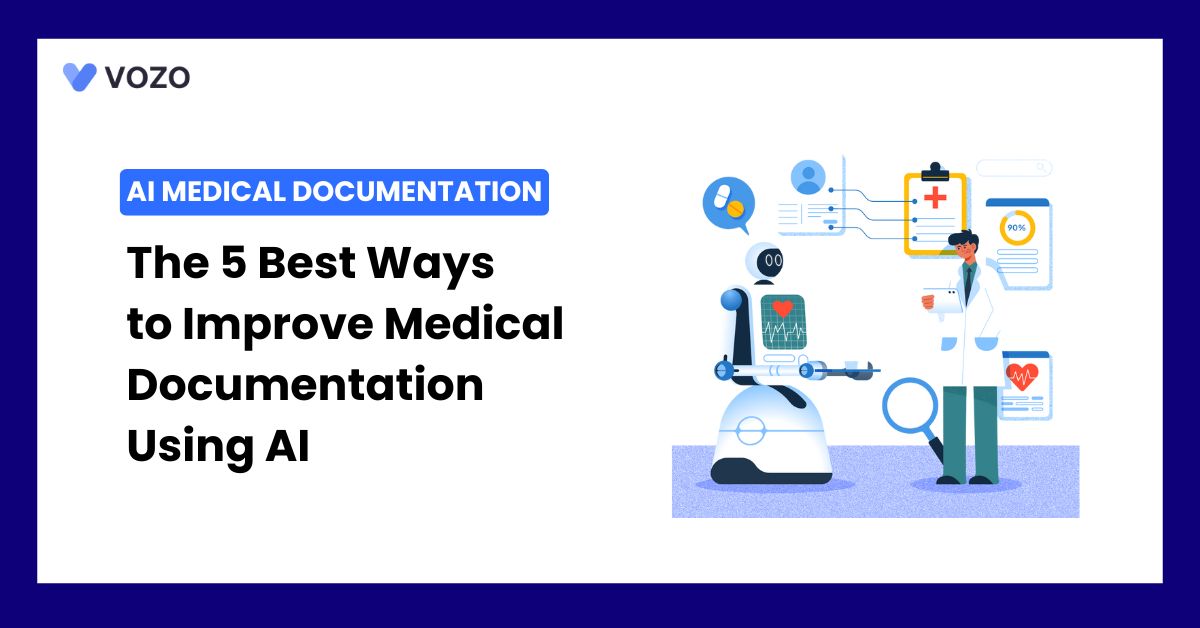The 5 Best Ways to Improve Medical Documentation Using AI
Medical documentation is one time-consuming task that limits providers to provide care for patients. A Study conducted by national institutes of health revealed that physicians spent around 35% of their time documenting patient data. Even though it is time-consuming, medical documentation is important for various operations in healthcare.
Considering the importance, healthcare professionals seek many ways to simplify the process as well as reduce the time for providers. Recently, AI has been popular and rapidly growing, even in the healthcare industry.
One of the key areas that AI has impacted is the electronic health records. By integrating AI and EHR, healthcare providers can automate the documentation process and routine tasks. In this blog post, we have shared the 5 best ways to improve medical documentation using AI.
5 Best Ways AI Can Improve Medical Documentation
These are the 5 best ways AI improves medical documentation.
1. Automated Data Entry
Manually entering data can lead to many errors and cause inefficiencies in workflow.
By leveraging AI, healthcare providers can eliminate human-made errors. It can automate the data entry process, saving healthcare providers more valuable time.
- AI automatically captures patient details from multiple sources.
- Automating the data entry can reduce errors and ensure more accuracy in patient records
- Healthcare professionals can access patient records in real time across systems.
- The integration of AI and EHR makes it easier to quickly update and access patient histories.
Ultimately, AI can save time for providers and let them focus on delivering patient care. Also, this enables providers to make faster decision-making during patient visits.
2. Speech Recognition for Documentation
AI has the speech recognition module which fastens the medical documentation process.
During the patient visit, patients and providers used to have interaction. Using AI Speech recognition, healthcare providers can document patient interaction.
- It transforms speech into structured medical documentation.
- Integrating EHR means providers can ensure that records are complete and capture all necessary clinical details.
- Speech recognition can speed up the medical documentation process.
- The ability to dictate notes hands-free ensures more focus on the patient during consultations.
This way, healthcare providers don’t have to type clinical notes manually during patient interaction. It also reduces the time spent on paper records while maintaining patient data.
Related: The Benefits of AI in Your EHR System
3. AI for Documentation Error Detection
Errors in medical documentation can lead to conflict in many healthcare operations like billing, diagnostic decision-making, and all. AI can solve this problem by detecting errors effectively.
Clinicians can instantly correct errors or add information in the missing fields.
- AI can detect any gaps in patient health records so that clinicians can fill the gap with accurate information.
- Automated error detection ensures compliance with regulation which reduces penalties.
- The system can compare new data with historical records which helps to identify any discrepancies.
AI can improve the overall quality of medical documentation. It helps healthcare professionals to maintain error-free and accurate patient health records.
4. Predictive Text and Suggestions
Speeding up the medical documentation is important. So, that healthcare professionals quickly finish documentation work and focus on other important operations.
AI has predictive text and suggestions that speed up the medical documentation process.
- It helps clinicians to complete clinical notes faster while ensuring accuracy.
- Predictive text reduces the cognitive load on healthcare professionals.
- AI-powered suggestions ensure standardizing across all documentation.
- The use of AI-generated templates allows healthcare providers to input data quickly.
This way, clinicians can ensure consistency in patient records. Also, it can save more time during the process of medical documentation.
5. Natural Language Processing
Various medical records have unstructured text.
Clinicians may struggle to extract patient data from this unstructured text. NLP which is Natural Language Processing helps to solve this.
- It helps to extract structured information from unstructured text.
- AI can automatically identify and categorize medical terms, diagnoses, and treatments.
- NLP helps clinicians quickly find relevant information.
- NLP ensures that documentation is consistent and up-to-date
The ability to extract key information from free-text notes makes it easier to maintain comprehensive patient records without additional manual input.
Related: AI in Healthcare: What You Needed to Know (2024)
Vozo EHR (With AI Features) for Streamline Medical Documentation
If you are searching for the best EHR system for your healthcare practice, Vozo EHR can be your go-to choice. With features like AI Charting, Vozo EHR helps you to automate the workflow.
Our comprehensive EHR solution lets you focus more on patient care while carrying all the burdens and simplifying it.
- Vozo Cloud EHR’s cost-effective cloud subscription benefits all levels of practice.
- Our feature-rich EHR helps you rectify mistakes efficiently and speed up the process.
- Vozo Specialty EHR resonates with specialty practice needs and requirements.
- Our expert technical team got you covered 24/7 if any needs arise.
- Our EHR System continues to scale as your healthcare practice grows to improve the user experience.
The Vozo Customized EHR solution benefits your healthcare practice by:
- Streamlining the administrative process
- Improving workflow efficiency
- Reducing proneness to errors
- Manages all the patient’s records in one place
- Offers greater efficiency and cost-savings across the board.
Our specialty-specific tools like scheduling, patient portals, lab integration, cloud hosting, and more meet the specific needs and requirements of your healthcare practice.
“Embrace Vozo EHR to Reduce Your Burdens and Enhance Patient Care”
About the author

With more than 4 years of experience in the dynamic healthcare technology landscape, Sid specializes in crafting compelling content on topics including EHR/EMR, patient portals, healthcare automation, remote patient monitoring, and health information exchange. His expertise lies in translating cutting-edge innovations and intricate topics into engaging narratives that resonate with diverse audiences.













